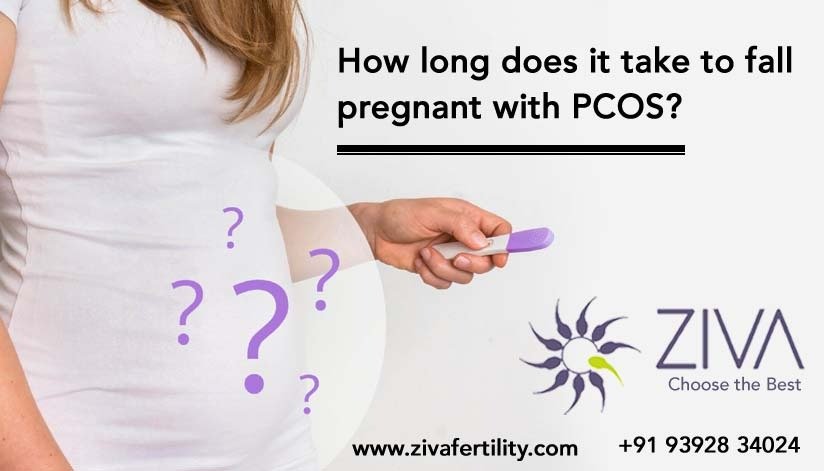If you have polycystic ovary syndrome (PCOS) and want to have a baby, you may wonder how long it will take to get pregnant. Polycystic ovary disorder is a typical condition that influences one of every five women. PCOS can make conception difficult, but you will be glad to know that you can still get pregnant with the treatment. But there are many variables and fewer guarantees.
Several factors need to be considered, e.g. how old are you? How old is your partner? Are both of you healthy? Do you have any risk factors for conditions that could affect your fertility (e.g., exposure to toxins, heavy alcohol or drug use, or a history of sexually transmitted infections)? How well is your PCOS managed?
This article provided by Ziva Infertility clinic gives information about “How Long Does It Take To Fall Pregnant With PCOS?”.
What is Polycystic Ovary Syndrome (PCOS)?
PCOS is a disease related to hormones that causes ovulation problems. Ovulation is the process by which a mature egg is released from the small fluid-filled sac (follicle) into the ovary every month. Women with PCOS produce higher than normal testosterone, which can prevent ovulation and cause irregular or no menstruation.
Specifically, a hormonal imbalance affects the follicles’ ability to release eggs, which instead remain on the ovaries as cysts – hence the name poly (which means a lot) – cystic ovary syndrome.
How does PCOS affect my fertility?
PCOS symptoms, including irregular or no periods, and a documented risk of miscarriage and need to see a doctor immediately. However, it’s important to remember that polycystic ovaries aren’t always bad news. For example, much younger women can experience serious side effects from the syndrome caused by the hormonal imbalance associated with polycystic ovaries. However, as we get older, the number of follicles decreases and the hormonal imbalance is corrected.
The result is that women who have polycystic ovary syndrome in their teens and twenties sometimes have more eggs by the age of 30 and therefore have a greater chance of becoming pregnant.
How long will it take to get pregnant?
If you’re younger than 35, you ovulate regularly (even though you have PCOS). If you and your partner don’t have any other medical conditions that affect your fertility, you can get pregnant within a year and possibly sooner. However, if the couple suffers from decreased sperm count or uterine fibroids, this can take longer than a year.
Natural fertility decreases significantly in women at age 32 and further decreases after 37. Thus, while some women get pregnant naturally by the age of 40, the need for fertility drugs or technology is very high.
Factors That Can Increase Fertility with PCOS
Fertility measures such as changing your diet, taking nutritional supplements, or increasing your physical activity can make your body healthier and help you achieve a healthier pregnancy. In some cases, weight loss associated with a healthy diet can be an effective way to help you get pregnant.
For women with PCOS, weight loss and a healthier lifestyle can be the most important things to get pregnant quickly. Several studies have shown that women who lead healthier lifestyles have more regular periods and, as a result, the rate of conception increases.
Lifestyle changes that can increase fertility
Small changes in your lifestyle can play a big role in increasing your fertility, including:
- Weight Loss: Obesity can have a big impact on your fertility. According to several studies, losing as little as 5% weight can greatly increase your chances of getting pregnant.
- Regular exercise and a healthy diet: This helps lower blood sugar levels and reduce the chances of developing type 2 diabetes.
- Eat five servings of fruits and vegetables a day and a healthy and balanced diet: This is beneficial for your fertility. Since women with polycystic ovaries are more likely to experience heart disease and high cholesterol, this is very important for their overall health.
- Avoid caffeine and alcohol (yes, if you are addicted to it)
- Reduce stress
The PCOS Diet – What Should I Eat Or Avoid To Increase My Fertility?
Eating a healthy, balanced diet has been shown to increase your fertility. However, there are some foods that you should eat more of and some that you should limit or avoid.
- Eat less meat – Reduce your meat intake and eat good quality organic meat when you eat it. Too much meat can exacerbate an imbalance in estrogen levels.
- Eat more plant-based protein – Try to get more beans, nuts, legumes, and other non-meat sources of protein.
- Incorporate omega-3 fats in your eating regimen: They have been shown to bring down testosterone levels.
- Consume Low-fat dairy:- Avoid consuming too many dairy products; small amounts of high-quality dairy can help.
- Take supplements – Deficiencies in certain vitamins and minerals can negatively impact your ability to get pregnant. Your doctor will recommend supplements.
When to seek help?
Most experts recommend that if you don’t get pregnant after a year of unprotected sex and below 35, you should seek treatment. If you are over 35, that number drops to six months. If you don’t get regular periods or notice other fertility problems such as PCOS or endometriosis, see a reproductive gynaecologist at the Ziva infertility clinic right away.
What can a Ziva infertility clinic doctor do?
Ziva infertility clinic doctor can determine the best treatment for you. Oral contraceptives can also protect you from PCOS if used for a long time, and your doctor can advise which treatment is best for you. For example, you may be advised for one of the following treatments :
- Clomiphene: A drug that stimulates ovulation. Success in stimulating egg release is usually monitored by ultrasound.
- Metformin: Can be prescribed to control insulin levels. It is typically used in type 2 diabetes and helps with PCOS-related insulin resistance. Many women diagnosed with PCOS are often automatically recommended metformin. However, it is important to have a reason to use metformin; hence it is best to consult with your doctor.
- Provera and other hormonal treatments: These drugs are prescribed to stimulate menstruation.
- Letrozole and tamoxifen are two breast cancer drugs that can also be used “off-label” if a doctor believes the benefits outweigh the side effects or risks. They can be used to treat ailments before trying to get pregnant. Hence, you must follow your doctor’s advice. If you become pregnant, stop immediately and call your doctor.
- Gonadotropin injections: Stimulate the ovaries to produce eggs when oral medications are not successful. However, you can lead to multiple pregnancies because of the risk of over-stimulation, which may seem like good news, but maybe more than you agreed to.
- Laparoscopic ovarian drilling: This is a surgical procedure far from being as bad as it sounds. The surgeon will make a small incision in your abdomen, insert a thin tube into the ovary, and remove some affected tissue.
Conclusion:
Polycystic Ovary Syndrome affects different women differently – but don’t worry, you are not alone. You can speak to a doctor at the Ziva infertility clinic. Also, if you know or suspect you have PCOS and want to be pregnant, call us at 9392834104 or make an appointment at Contact us – Zivafertility.
















